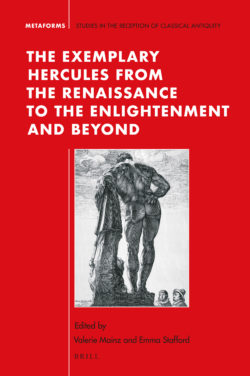The Exemplary Hercules
 This is the second of four volumes associated with the Hercules Project, all arising from the 2013 and 2017 conferences, with some additional commissioned chapters. These volumes are to appear in the Brill series Metaforms: Studies in the Reception of Classical Antiquity over 2020 and 2021.
This is the second of four volumes associated with the Hercules Project, all arising from the 2013 and 2017 conferences, with some additional commissioned chapters. These volumes are to appear in the Brill series Metaforms: Studies in the Reception of Classical Antiquity over 2020 and 2021.
The volume The Exemplary Hercules from the Renaissance to the Enlightenment and Beyond covers receptions of the hero in the early-modern period (other than topics which belong in the volumes on the Christian Hercules or on performance). General issues pursued include: the extent to which Hercules was considered to be the incarnation of virtue, and ways in which this might be problematized; continuities and contrasts between representations in different media at different times and in different places; notions of self-fashioning and the undoing of the governmental model; Roman Catholic and Protestant approaches to the pagan model. The volume was published on July 30th 2020. It can be ordered via Brill's website.
Cover image: Hendrik Goltzius, The Farnese Hercules (engraving 42.1 x 30.4 cm, c.1592 but dated 1617), British Museum 1854,0513.104.
Editors: Valerie Mainz (Leeds) and Emma Stafford (Leeds)
Overview of Contents with links to abstracts
Emma Stafford, Preface
Valerie Mainz and Emma Stafford, Introduction: the transmission of a classical tradition in theory and practice
i) Applying the Model of the Princely Ruler
Ioannis Deligiannis, The Choice-making Hercules as an Exemplary Model for Alessandro and Federico Gonzaga and the Fifteenth-century Latin Translation of Prodikos’ Tale of Herakles by Sassolo da Prato
Paul Gwynne, Macte animis, Caesar, nostros imitare labores: Hercules and the Holy Roman Empire
Anne-Sophie Laruelle, Hercules in the Art of Flemish Tapestry (1450-1556)
Annie Verbanck-Piérard, Prince Charles Alexander of Lorraine and Hercules: a political emblem between tradition and innovation
ii) Exploiting the Model
Pamina Fernández Camacho, What Identity for Hercules Gaditanus? The role of the Gaditanian Hercules in the invention of national history in Late Medieval and Early Modern Spain
Joanna Woodall, Monstrous Masculinity? Hendrick Goltzius' 1589 engraving of The Great Hercules additional images for this paper are linked from this page.
Marc Bizer, Literary Hard Labour: lyric and autobiography in Joachim du Bellay
Russell Goulbourne, Voltaire’s Hercules
iii) Challenging the Model in the Later Eighteenth Century
Alexandra Eppinger, Hercules the Younger. Heroic allusions in late eighteenth century British political cartoons
Valerie Mainz, Hercules, his Club and the French Revolution
Manuel Caballero, New Representations of Hercules’ Madness in Modernity: the depiction of Hercules and Lichas
Tomas Macsotay, How Hercules Lost his Poise: reason, youth and fellowship in the heroic neoclassical body
